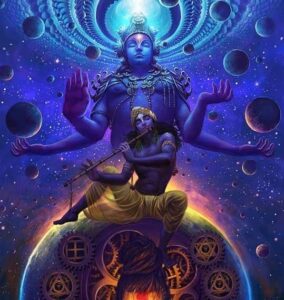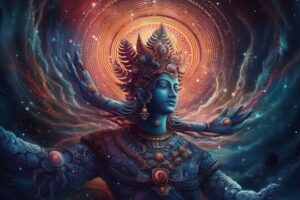INTRODUCTION
Bhakti is the soul’s devotion, participation, and service to the lotus feet of the divine mind which is beyond the spatial-temporal considerations. To have a deep connection and experience of the entity that is transcendental and soothing in nature and spirit.
Narada says, “Bhakti is that exercise of devoting every act of a human to the almighty and feeling deep pain even in the thought of being separated from the god” he then, goes forward to assert that Bhakti is that “after which, one desires nothing, finds delight in nothing, fears nothing, and is not excited about anything worldly. It can happen only because the human builds a deep attachment towards the lord’s beautiful form and his service.
MAIN DISCUSSION
Now, by the words of Narada, I commence this task: athāto bhaktiṁ vyākhyāsyāmaḥ, now we shall understand the true nature of Bhakti. As Narada rightly puts it that bhakti is: sā tv asmin parama-prema-rūpā it means that there is no doubt that the service towards god is in the form of infinite love and admiration of the almighty. The god is all merciful and loves his subjects as his own part, he is acting as the Omnipotent, Omniscience, Eternal Love and shower care towards them and In the moments of performing this, one’s love for the god exponentially grows in likeness. He or she shares the lord’s perfection and partakes in the everlasting joy that provides him with eternal peace and tranquility.
The Bhaktā does not love God for the sake of some higher material good but he loves the Lord for love’s sake- pure love sans material or worldly expectations. The lord and the Bhaktā are held together with a strong string which holds deep within the Hriḍãya Akāṣ of the Bhaktā. Narada Bhakti sutra also provides us with different interpretations pertaining to the concept of Bhakti- the rich tapestry of Indian tradition offers wide array of observations in this regard, they are as follows:
Sage Vyāsa says “Bhakti is the love for worship and other such activities” whereas, Sage Gārga asserts that “Bhakti is fondness for spiritual conversation and the like”, on the other hand, Shanḍīlayā riṣhi contends that “it is Bhakti as much as in the regard that, it does not interferes in one’s contemplation of self” and to bring down the curtains of this parlance, Narada again reiterates that “Bhakti is serving every action of a person to the lord and feeling deep distress in the moments of losing remembrance of him”; he says this in 31 verse: “Bhakti is it’s own fruit”
Bhakti is the module of spiritualism devoted towards the ageless divine spirit which bestows the benediction upon his creations and pupils. How beautifully Shānkaracḥaryå puts it beautifully in Bhavānī Ashtakām that:
“Araneye, saranye sada maam prapahi,
Ghathisthwam, Gathisthwam, thwam ekaa Bhavani”
It roughly means that wherever I go, be it in the forests, inside a shed, in safe and even in harsh ravages of time, I shall always bow down to you- Bhavani who is the ultimate objective- sole end and final destination of my actions- in the Yogā philosophical sense: to be one with Påramatṁa.
CONCLUSION
Bhakti can only spring from the detachment towards the object of senses and other material objects and relations. It is the most suited way, out of the three ways which Indian Philosophy offers out of which two are Jñan and Kårṁa maṛgā, Bhakti Maṛgā is best “for attaining of salvation” as per Narad. One of the major things in all these parlance is the underlying fact that Bhakti can only be accomplished by the grace of god and having Knowledge of the scriptures and vedas as the major footing over which we build the structure of the bhakti.




















